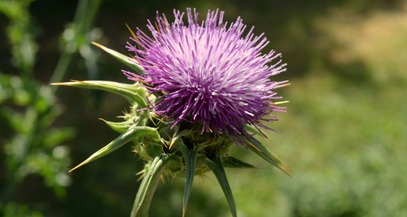
The liver is the body’s second largest organ and performs many essential functions in relation to digestion, metabolism, immunity, and the storage of nutrients within the body. If the liver lacks energy and nutrients, it could die quickly. However, positive side is that the liver can regenerate dead or damaged tissues quickly if it is properly taken care of.
Fairly recent studies have shown that milk thistle have powerful cancer suppressing abilities when used alone or along with other medicinal agents.
Milk thistle is a 2,000-year-old remedy for a variety of ailments. Silymarin, is a flavonoid found, in the seeds of milk thistle and it’s known to detoxify and protect the body against environmental toxins. It acts as an herbal remedy for ailments such as liver, kidney, and gallbladder problems. Silymarin has antioxidant and anti-inflammatory properties, which may help the liver repair the liver by growing new cancer cells.
Research shows that back in 1986, milk thistle was finally approved for treating liver diseases, such in cases as alcoholic hepatitis, alcoholic fatty liver, cirrhosis, liver poisoning, or viral hepatitis. In addition, it has been shown to protect the liver from toxins created by medications such as acetaminophens, which are non-aspirin pain suppressors.
It’s native roots come from the Mediterranean, however, now it can be found throughout the world. The height of the plant can reach up to ten feet high and its name is received from the milky white sap that emits from the leaves when squashed.
Milk thistle has anti-cancer properties.A study conducted by Dr. Ke-Qin Hu, at the University of California, concluded that milk thistle could be used confidently as a preventive against liver cancer, which is found to be one of the most prevalent cancers worldwide. In Hu’s findings, milk thistle showed the ability to reduce cancer cell cycle speed.
While milk thistle is highly recognized for supporting the liver, another study pointed out that it exhibits anti-proliferative effects against MCF-7 breast cancer cells. As the researchers indicate, “Our results show that silibinin blocks mamalian target of rapamycin signaling with a concomitant reduction in translation initiation, thus providing a possible molecular mechanism of how silbinin can inhibit growth of transformed cells.”
